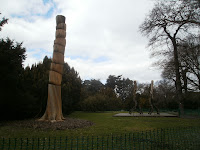Book review:
Full Throttle by John Caldwell & Trish McLean with Paul Little
I don’t think I’ve seen or read a flipbook since I was in intermediate.
This isn’t a criticism; with two slightly different covers, Full Throttle is a
refreshing change to the auto/biography genre, especially in an Australasian
setting.
 Full Throttle gives the life stories of CEO’s Trish McLean and John
Caldwell, and the history of Retailworld Resourcing, in New Zealand and
Australia. Despite being New Zealand’s second largest employer, RWR
acknowledges that retail often gets a bad rap, and provides an excellent
service to find excellent employees for high-quality jobs in New Zealand,
Australia, and The UK. Through John’s story especially, you can see where a
career in retail can take you, especially after the childhood he had.
Full Throttle gives the life stories of CEO’s Trish McLean and John
Caldwell, and the history of Retailworld Resourcing, in New Zealand and
Australia. Despite being New Zealand’s second largest employer, RWR
acknowledges that retail often gets a bad rap, and provides an excellent
service to find excellent employees for high-quality jobs in New Zealand,
Australia, and The UK. Through John’s story especially, you can see where a
career in retail can take you, especially after the childhood he had.
As a flipbook, you read Trish’s story, flip the book over, read John’s
story, and then read their joint story of building the business and brand of
RetailWorld in the middle. The book uses a mix of first and third person, which
I personally didn’t enjoy (I prefer first person), but there really isn’t
anything wrong at all with it, just my own crazy reading habits.
Being a business thriving to one hit dramatically by the Global
Financial Crisis, RetailWorld morphed into a franchise to survive. And is still
going strong today. Trisha and John managed to pull through, despite some
incredibly tough times, and tell a story that really shows what amazing working
relationships (especially with the bank) can do.
“If you go from running one café to owning 10 cafes, you are no longer
someone who runs a café. You are a business owner and you have to step up to
that role. We are now franchisors; we are not recruitment people any more.”
The section about the business itself contains really great information
for anyone looking into launching a start-up, or just generally interested in
the world of business. The section has ‘take-aways’ at the end chapter, giving
tips and hints Trish and John have discovered during their time together.
One thing I really did enjoy throughout Full Throttle is the sheer love
both Trish and John show for their business and the people who help them do
their job each day. I’ve always worked in really great retail stores, but I’m
aware of debacles that can happen within the industry, and it’s refreshing to
see people in charge of finding high-end management are actually fantastic at
their jobs.
My one major criticism of the book is really only one based on my own
background in publishing – the final draft needed a really, really good
proofread. I’m distracted easily by hyphens and en dashes used interchangeably,
a lack of a fullstop, or basic grammatical mistakes. But this doesn’t take away
from what is, in essence, a really interesting story that you may not have
necessarily picked up off the shelf.
All in all, a fantastic and engaging read for anyone interested in the
world of business, or just looking to read about two interesting and totally
different lives that came together to create a recruitment agency which still
thrives today.
Full Throttle
by John Caldwell & Trish McLean with Paul Little
Published by RWR IP Partnership
ISBN 9780473228279
by John Caldwell & Trish McLean with Paul Little
Published by RWR IP Partnership
ISBN 9780473228279
Originally published on the Booksellers NZ blog






